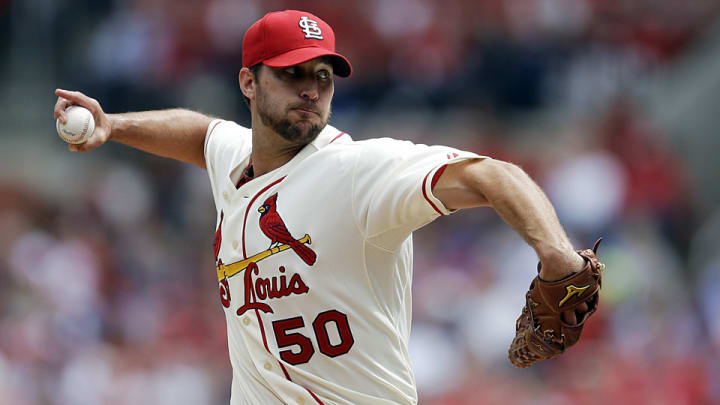Inside the head and the game of Adam Wainwright, baseball philosopher

ST. LOUIS -- He’s one of the rare pitchers whose brain may be more crucial to his success than his arm, a baseball philosopher with a twang, and these days, Adam Wainwright deals as much in intelligence as athleticism.
“I’d like to think I’m smarter than I’ve ever been, which is not saying much,” says the Georgia native and ace of the Cardinals. “But as far as my pitching IQ, I think it’s higher than it’s ever been.”
So far in 2014, smarter has translated to a 10-3 record and a 2.08 ERA, good for first and second, respectively, in the National League. Wainwright is on pace for 21 wins, which would be a career-high, and his ERA would also be a personal best, meaning he could be in the midst of his best season yet.
Wainwright has been having success since his rookie season of 2006. As a rookie reliever that year, he closed out all three series-clinching victories en route to St. Louis’ world championship. He became a starter in 2007 and by ’09 he was one of the best in baseball, finishing third in the Cy Young voting that year and second the next. He missed all of the 2011 season with Tommy John surgery, however, but returned the next year and by 2013 he was once again among the game’s elite pitchers, finishing second once more in the NL Cy Young race. Now 32, he’s chasing that elusive award as the unquestioned leader of the Cardinals' young, flamethrowing staff, with a new approach for how to do his job.
“[It's] something that I started in 2012, when my stuff was not very good after Tommy John surgery [and] I had to find new ways to get outs,” he says. “Then when my stuff returned… I had a little more wisdom from going through tough times.”
His new mindset is the product of the revamped method of analysis that Wainwright embraced while sitting out in 2011 and watching his team win the World Series without him. Before that season away, he was an observer. With so much time on his hands that summer, he became a student. Instead of simply cheering on his mentor, Chris Carpenter – and there was plenty of that, to be sure – Wainwright began to break down his game. He studied Carpenter’s methods, the way he attacked hitters. He looked for patterns and variations, and he spread his study across the league’s best arms, picking apart starts by the likes of Cliff Lee and Roy Halladay, who finished that season with 17 and 19 wins, respectively, for the Phillies.
Those hours of watching taught Wainwright the best way to attack – sometimes powerfully, sometimes strategically. He learned when to add a hint more movement, when to eke out that extra ounce of velocity. He learned that his breaking ball doesn’t have to always overwhelm. Sometimes, he can ease up, pitch a little slower, aim a little bit off the plate. The hitter will bite because the whole thing is orchestrated, and Wainwright, like the other greats, is a maestro on the mound.
“There’s been several games… where I have had a master plan and it came completely into reality during the game, all the way from ‘This guy’s going to fly out to right on this pitch’ to ‘I think that I’ve got him leaning a certain way, he’ll foul this ball off, and I’ll hit him back inside on the next pitch.’” Wainwright says. “That’s the cool part, to know that I was so prepared for that start, that I had such a good plan in my mind and I executed it to the point that it happened the way I thought it should happen.”
Manager Mike Matheny is keenly aware of Wainwright’s development since he took the job in St. Louis in 2012. Back then, the starter was coming off surgery, and his stuff was shaky, at best. With a new regime in place, Wainwright felt an extra motivation to prove himself, despite the fact that he’d been a 20-game winner before his surgery. That, too, contributed to his push toward smarter over stronger, and Matheny acknowledges that comparisons to Greg Maddux, who was known as the Professor during his career and will be inducted into the Hall of Fame this summer, may not be too far off base.
“He’s really just taken his stuff to another level by being able to maximize the aggressiveness of hitters and have more of a sense of where guys are,” Matheny adds.
Wainwright has also developed a cutter since his surgery, which complements his 90-mph fastball and a biting curveball that is one of the best in the game. It’s an impressive repertoire – on any team but the Cardinals.
St. Louis’ roster boasts a seemingly never-ending supply of young 20-somethings whose pitches often hit 100 mph, as if the team is growing them in some remote Missouri cornfield. Carlos Martinez’s fastball averages 97.0 mph, Trevor Rosenthal’s 96.5, Kevin Siegrist’s 94.7, Shelby Miller’s 93.3 and Michael Wacha’s 93.0. All five of those players have cracked the majors in the past three seasons, and Wainwright has watched all the while, shaking his head.
“It’s a good thing I’m real secure in who I am as a pitcher, because if I’d been thrust into this spot five or six years ago, I’d be out there heaving the ball as hard as I could trying to keep up with these youngsters throwing the ball 100 mph,” he says, laughing.
On June 17, Wainwright skipped a start to rest his aching elbow, and his replacement, Martinez, hit 101 mph in the first inning. While much of St. Louis fretted over its sidelined ace, Wainwright simply reclined in the dugout. “See boys, everything’s fine,” he told his teammates, and sure enough, the Cardinals won that night, and Wainwright was back four days later, logging eight innings while allowing just six hits and one run in a victorious performance.
In the clubhouse, Wainwright is a quiet presence, but the Cardinals’ younger generation of pitchers knows exactly where to look for guidance.
“If you just watch him on a daily basis, how he works, whether it’s his work ethic, whether it’s him getting out there doing is stuff or his focus on gamedays and his thought process on the mound, some of these young guys – and not that I’m that young of a guy – it’s something we can all learn from,” says Jason Motte, St. Louis’ 32-year-old reliever and a longtime teammate of Wainwright’s.
At the root of Wainwright’s approach lies one pervasive trait: he is a control freak. Going into 2013, his goal was to walk fewer batters than he had starts, and because he fell just short -- issuing 35 free passes in his 34 outings -- it’s still on his mind as a goal for this season, or the next, or the one after that. Walks are what keep him up at night, the nagging annoyance of having no control and allowing an opponent a free base. Just talking about them irks him.
There is one thing Wainwright cannot control, though: other pitchers. He finished third in the NL Cy Young voting in 2009 after going 19-8 with a 2.63 ERA and 212 strikeouts, despite having more first-place votes than anyone else. When he was second in 2010 (20-11, 2.42 ERA, 213 strikeouts) and 2013 (19-9, 2.94 ERA, 219 strikeouts and a major-league-high 241 2/3 innings and five complete games), his numbers were good enough to win. The award still lurks in the back of his mind, and as much as he tries to downplay it, the near misses agitate him. He can still rattle off opponents' numbers from those seasons, and doing so brings out a certain introspection. “One of these years, [I] might be good enough,” he says.
The only year he’s pitched recently that he wasn’t good enough was in 2012. In his first months back from Tommy John, Wainwright struggled, starting the season 2-5 with a 5.77 ERA. He swears hitters were clamoring to face him, and for a time, he says, his ratio of fly balls to home runs was approaching Home Run Derby levels. On May 22, 2012, though, that changed. It was at Busch Stadium against the Padres, and Wainwright, who hadn’t pitched more than seven innings that spring, threw a complete-game, four-hit shutout.
“I got really emotional after the game, just during my postgame, because I knew I was going to make it,” Wainwright says. “I’m very optimistic, so for months, I kept telling myself, ‘You’re going to be fine. You’re going to come out of it.’… I could see the light at the end of the tunnel that I was going to get back.”
That day, Wainwright was once again the pitcher he knew he could be. His arm had finally caught up with his mind, and since then, the two have kept pace.
“You’re largely a product of what you tell yourself you are,” Wainwright says. “Your body will listen to what your mind says it is. … There’s (plenty) of people that have better stuff than me in the big leagues, but I think I’m better than I am, so it works in my favor. You are what you believe you are.”
And just what does Wainwright belive?
“I believe I can be great at this game.”
